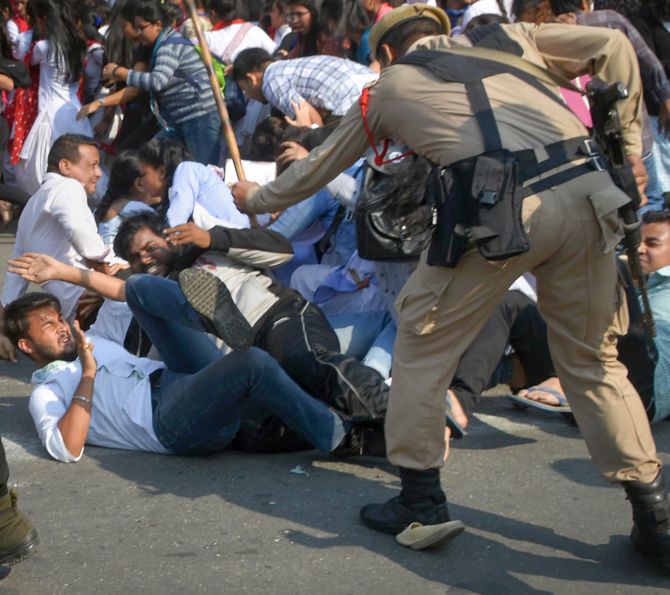GUWAHATI/NEW DELHI : Assam turned into a battleground on Wednesday with massive and violent protests across the state against the Citizenship (Amendment) Bill, but the government pushed the contentious legislation through Parliament overruling a vociferous Opposition that alleged it was against the idea of India as a secular nation.
As thousands of people including students hit the streets in Assam, police fired rubber bullets and tear gas shells and baton-charged the protesters leaving many of them injured, while curfew was imposed in Guwahati and a clampdown on internet services was announced across several districts of the state.
Similar protests rocked several other North-Eastern states, but the bill was passed by majority later in the evening in Rajya Sabha after a hours-long debate, two days after it was cleared in Lok Sabha. The bill now requires President’s signature to become a law.
Army deployment was announced in Tripura and Assam, where the influx of Bangladeshi immigrants has always been an emotive issue for natives of the state. The Centre also airlifted 5,000 paramilitary personnel to Northeastern states, including Assam, for maintenance of law and order duties.
Agitated students, protesting against the proposed law that seeks to grant Indian citizenship to all but Muslim refugees from Pakistan, Bangladesh and Afghanistan, blocked road and rail traffic, pulled down barricades and even lobbed back the shells fired at them by the police.
A motorcycle rally was also organised against the bill, while discarded tyres, wooden logs and vehicles were set on fire as chaos prevailed on highways.
They also damaged a stage erected for Prime Minister Narendra Modi’s proposed summit meeting with his Japanese counterpart Shinzo Abe on Sunday, while pulling down hoardings and banners advertising the government’s welfare schemes and made a bonfire of those before the secretariat.
Though no single party or student body had officially called for a shutdown, the protesters fought pitched battles with security forces in the restive state, including in front of the secretariat, the seat of the state’s BJP government, plunging the state into chaos of a magnitude unseen since the violent 6-year movement by students that ended with the signing of the Assam accord in 1985.
Anti-CAB protests were also held in the national capital at Jantar Mantar and in several other parts of the country, even as the government strongly pushed for the bill in Rajya Sabha despite vociferous opposition by several parties who alleged the proposed law was a direct attack on the Indian Constitution and on the country’s secular character.
The RSS, meanwhile, readied plans to launch a nationwide campaign in favour of the proposed law, with a top functionary saying the bill would have a limited impact in Assam but will benefit more than 1.5 crore people across the country, including over 72 lakh in West Bengal itself.
The RSS and BJP leaders said the persecuted Hindus, Sikhs and Buddhists who have been staying in India for a decade will benefit and asserted that that they are “natural citizens” of the country.
After getting the bill passed in Lok Sabha on Monday, Home Minister Amit Shah made a strong pitch for its passage in Rajya Sabha while rejecting a strong opposition by several parties and sought to return the criticism towards the Congress saying this legislation got necessitated because of partition at the time of independence.

